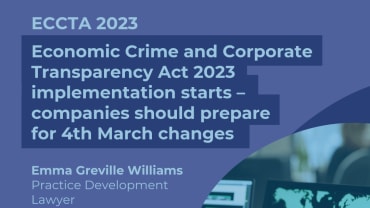We recently published a Legal Update on the UK Government's Future Fund. The £250 million fund, which is intended to provide financial support to innovative start-ups in the UK, will be invested by way of convertible loans. With that new scheme in mind, we've now looked at the key terms of convertible loans generally, and the advantages and disadvantages of such loans for both the investee company and the investor.
What is a convertible loan?
A convertible loan is a loan which will either be repaid or, in most cases, convert into equity at a future date. These loans represent a form of financing which ordinarily takes less time than an equity funding round (which can be both costly and time-consuming).
Convertible loan notes allow companies quick access to cash (often in anticipation of an equity funding round completing at a later date).
But as with any commercial loan (and particularly because the loan is capable of converting to equity), there are a number of key terms to be considered and negotiated between the relevant parties .
When is the loan convertible?
The investor and the investee company will negotiate the 'trigger' for the conversion of the loan notes into shares. This will typically be either an agreed date or a qualifying round of equity funding. Note that further triggers would include default, change of control and the sale or liquidation of the company.
When negotiating the amount of funding which must be raised before a round constitutes a qualifying round, there will need to be a compromise to reflect the company and the investor's respective interests.
The investor will want the threshold amount to be high enough to ensure that, if the loan does convert to shares, those shares are in a company which is both promising and sufficiently funded. The investee company, however, will want to ensure that the stipulated amount is both realistic and achievable.
What will be the price per share on a conversion?
The parties should consider the conversion price and the class of shares on conversion. The loan will normally convert either at an agreed price or (more commonly) at a discount against the price achieved per share in the qualifying round of funding. This would, of course, be subject to adjustment in certain circumstances – for example where the company might issue other shares or options during the period prior to conversion.
In terms of the class of shares, the loan investor will usually subscribe for the most senior class issued in the funding round when the loan converts.
The investor may also insist on a valuation cap. A valuation cap would protect the investor in the event of a sudden increase in the investee company's valuation. The loan would still convert to equity at the trigger event (i.e. the qualifying round or the specific date) but at a different price based on the valuation cap.
The parties should also consider any interest which will apply to the loan. Unlike an advanced subscription, a convertible loan may bear interest. However, the investee company may look to negotiate a position whereby the loan only accrues interest if it is redeemed, rather than converted into equity. Furthermore, the investee company may seek to defer interest payments under the convertible loan. This would have natural benefits for the company's cash flow.
Advantages of convertible loan funding for investee companies
Advantages of convertible loans for investee companies include:
- an ability to raise cash quickly in the early stages when full funding rounds are not achievable;
- the deferral of a company's valuation, giving time for the share price to increase and in turn reducing the amount of equity the company needs to give away at a lower share price; and
- a greater degree of control remaining with the existing founders and shareholders as the investor would ordinarily only seek minimal rights as a lender (e.g. information rights) and additional shareholder rights (e.g. matters requiring consent and director appointment rights) would be granted upon conversion of the loan into shares.
Advantages of convertible loan funding for investors
Advantages of convertible loans for investors include:
- if the company fares well and raises investment the investor can subscribe for shares at a discounted rate;
- if the company fails to raise sufficient investment, the investor can either ask for the loan to be repaid or, in the event of insolvency, rank ahead of the company's shareholders; and
- in some circumstances, a valuation cap on a qualifying funding round guaranteeing the investor a minimum percentage of equity if the company's valuation is higher than expected.
Disadvantages for investee company
Disadvantages of convertible loans for investee companies include:
- convertible loan funding does not qualify for Enterprise Investment Scheme or Seed Enterprise Investment Scheme relief (and is, therefore, not as attractive for investors);
- any valuation cap or conversion price mechanism still needs to be documented at the outset, which means there will be some time and cost spent negotiating these points; and
- if the convertible loan investors are receiving a large discount on the price paid for shares on a qualifying funding round then this may affect the valuation of the company in future rounds as new investors will not want to pay a much higher price.
Disadvantages for investor
Disadvantages of convertible loans for investors include:
- very few investor rights prior to conversion, other than rights to information regarding the company;
- convertible loan funding does not qualify for Enterprise Investment Scheme or Seed Enterprise Investment Scheme relief; and
- if the company requires bank funding then it is common for the loan notes to be subordinated to any bank debt, meaning the investors would not rank as highly in the event of insolvency (although they would be in a better position than other unsecured creditors).
How can Brodies help?
Our corporate team regularly advises on deals of this type and would be happy to assist if you are considering any type of equity or debt funding, either as an investor or investee company.
If you have any questions about this or any other matter relating to your business, please get in touch with any member of the corporate team or your usual Brodies contact.














